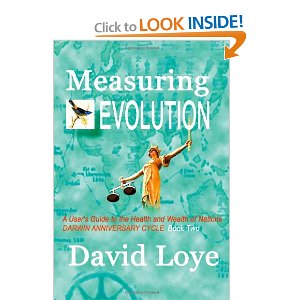
David Loye
![]() 6 Star Plus — Simple, Sensible Revolutionary, July 26, 2011
6 Star Plus — Simple, Sensible Revolutionary, July 26, 2011
I am astonished that there are no reviews of this book. I first learned of it from my reading of A Democratic Approach to Sustainable Futures: A Workbook for Addressing the Global Problematique, and now I have discovered other books by this author, among which I would quickly point to
Bankrolling Evolution: A Program for a President
Darwin's Lost Theory of Love: A Healing Vision for the 21st Century
The Healing of a Nation
This book is very fairly priced, and while it may come across to superficial reviewers as too simple or shallow, I find it to be engrossing. This is a really big idea ably presented, with very brief overviews of prior science, examples of organizational applications, and addendums including a pointer to The Darwin Project.
Evolutionary Systems Science is the meme, and morality is the method. This resonates with Will Durant's core point in The Lessons of History and the primary thrust of most of the books I have reviewed on building civilization (see my lists at Phi Beta Iota the Public Intelligence Blog, under Books), to wit, the only way to advance is to play a non-zero game, creating a prosperous world at peace, a world that works for all as Buckminster Fuller and Medard Gabel have consistently stated was possible with existing resources and technology. What I have learned is that corruption–and the rule by secrecy that enables corruption–are the cancer in the body of humanity.
The heart of the book, and certainly more than enough to warrant buying and appreciating this book, is the matrix for measuring evolution, with fifteen elements, each with three columns, one for indicators of progression, another for indicators of regression, and a third for regressive syndrome policies. I will just list the fifteen and heartily recommend the book:
Levels of Evolution
01 Cosmic
02 Chemical
03 Biological
04 Brain
05 Psychological
06 Cultural
07 Social
08 Economic
09 Political
10 Educational
11 Technological
12 Moral
13 Spiritual
14 Consciousness
15 Action
Consistent with the above, the author and those who have been his partners in this endeavor that spans many years, groups, and lines of inquiry, provides a “Code,” one finding for each that defines the healthy state for each, and I find this engrossing.
Some will want to down-grade this book to a four for its lack of attention to several other literatures such as those on conscious evolution, evolutionary activism, dialog and deliberation, and so on, but after going through this three times, my bottom line is that the author did something no one else had done before, discovered and disseminated knowledge of Darwin's observations and conclusions on the vital role of morality in evolution, and has gone on to offer a wide range of books all of which very politely trash Selfish Gene and all those associated with “survival of the fittest” in physical terms alone. Morality is a huge evolutionary advantage toward collective intelligence, collective consciousness, and collective sustainbility, and this is the sucking chest wound in “science.”
I have five links left, these books are distinct, but also emphasize the paucity of our present educational, intelligence, and research systems–the fragmentation of disciplines and sub-disciplines and lines of inquiry has gotten clinically insane. We desperately need to create an integrative holistic approach to education, intelligence (decision-support), and research.
Consilience: The Unity of Knowledge
God and Science: Coming Full Circle?
Surrender to Kindness: One Man's Epic Journey for Love and Peace
Philosophy and the Social Problem: The Annotated Edition
I am late to be aware of this author and his work, I could not have asked for a nicer introduction than this book.




